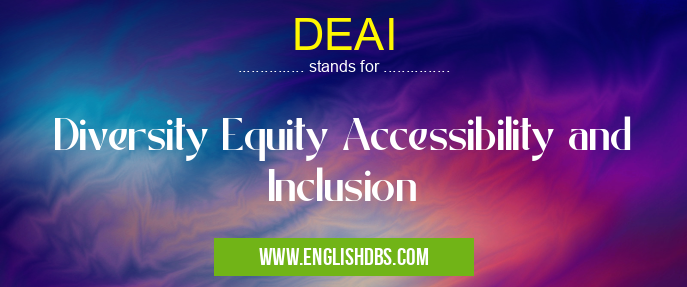What does DEAI mean in UNCLASSIFIED
DEAI (Diversity, Equity, Accessibility, and Inclusion) is a comprehensive approach to creating a workplace environment where all individuals feel valued, respected, and have equal opportunities. It involves recognizing and addressing systemic barriers that prevent marginalized groups from fully participating in the workforce.

DEAI meaning in Unclassified in Miscellaneous
DEAI mostly used in an acronym Unclassified in Category Miscellaneous that means Diversity Equity Accessibility and Inclusion
Shorthand: DEAI,
Full Form: Diversity Equity Accessibility and Inclusion
For more information of "Diversity Equity Accessibility and Inclusion", see the section below.
DEAI in Practice
Diversity: Goes beyond physical characteristics and includes a wide range of perspectives, backgrounds, and experiences. It encompasses race, ethnicity, gender, sexual orientation, age, disability, religion, and socio-economic status.
Equity: Ensures fair and impartial treatment of all employees, regardless of their background. It involves providing equal access to opportunities, resources, and support systems.
Accessibility: Creates an environment where everyone can participate fully, regardless of their physical or cognitive abilities. It involves making physical spaces, technology, and communication accessible to all.
Inclusion: Fosters a sense of belonging and ensures that all employees feel valued and respected. It involves creating a culture where diversity is embraced and everyone feels welcome.
Benefits of DEAI
Increased Innovation and Creativity: Diverse perspectives and backgrounds lead to more creative problem-solving and innovative ideas.
Enhanced Employee Engagement and Productivity: When employees feel valued and included, they are more likely to be engaged and productive.
Improved Employer Brand and Reputation: A commitment to DEAI attracts and retains top talent, enhances brand reputation, and promotes social responsibility.
Reduced Risk and Legal Compliance: DEAI practices help mitigate legal risks associated with discrimination and harassment.
Essential Questions and Answers on Diversity Equity Accessibility and Inclusion in "MISCELLANEOUS»UNFILED"
What is Diversity, Equity, Accessibility, and Inclusion (DEAI)?
DEAI is a comprehensive approach to creating and fostering an environment where all individuals feel valued, respected, and have the opportunity to succeed. It encompasses four key elements:
- Diversity: Embracing and celebrating differences in identity, background, and experiences.
- Equity: Ensuring fair treatment and access to opportunities for all individuals, regardless of their background or identity.
- Accessibility: Providing accommodations and support to ensure that individuals with disabilities have equal access to participation and success.
- Inclusion: Creating a welcoming and supportive environment where everyone feels valued and belongs.
Why is DEAI important?
DEAI is crucial for several reasons:
- Improved decision-making: Diverse perspectives lead to more innovative and effective decision-making.
- Increased innovation and creativity: Inclusion of individuals with different backgrounds and experiences fosters a more innovative and creative work environment.
- Enhanced organizational performance: Studies have shown that companies with strong DEAI initiatives outperform those without.
- Stronger community bonds: Creating an inclusive and diverse community strengthens social cohesion and fosters a sense of belonging.
How can I promote DEAI in my workplace or community?
Promoting DEAI requires a multifaceted approach:
- Education and awareness: Educate yourself and others about the principles and importance of DEAI.
- Inclusivity initiatives: Implement policies and practices that foster a sense of belonging and welcome for all individuals.
- Representation and participation: Ensure that diverse voices are represented in leadership positions and decision-making processes.
- Accessibility accommodations: Provide reasonable accommodations to ensure that individuals with disabilities have equal opportunities to participate and succeed.
- Ally and advocacy: Be an active ally and advocate for individuals from underrepresented groups.
What are the challenges to achieving DEAI?
Achieving DEAI can be challenging due to factors such as:
- Unconscious bias: Implicit biases can influence decision-making and create barriers for underrepresented groups.
- Systemic barriers: Historical and societal structures can perpetuate inequalities and create obstacles to inclusion.
- Resistance to change: Some individuals may resist efforts to promote DEAI due to fear or misunderstanding.
- Lack of resources: Organizations may lack the resources and expertise to effectively implement DEAI initiatives.
How can I measure the progress of DEAI initiatives?
Measuring the progress of DEAI initiatives is essential for ensuring their effectiveness. Key metrics include:
- Representation: Tracking diversity in leadership, workforce, and decision-making bodies.
- Inclusion: Assessing the sense of belonging and support experienced by all members of the organization or community.
- Equity: Evaluating the fair distribution of opportunities, resources, and outcomes.
- Accessibility: Monitoring the provision of reasonable accommodations and the removal of barriers for individuals with disabilities.
Final Words: DEAI is essential for creating a workplace that is fair, equitable, and inclusive. By embracing DEAI principles, organizations can unlock the full potential of their workforce, foster a sense of belonging, and contribute to a more diverse and equitable society.
